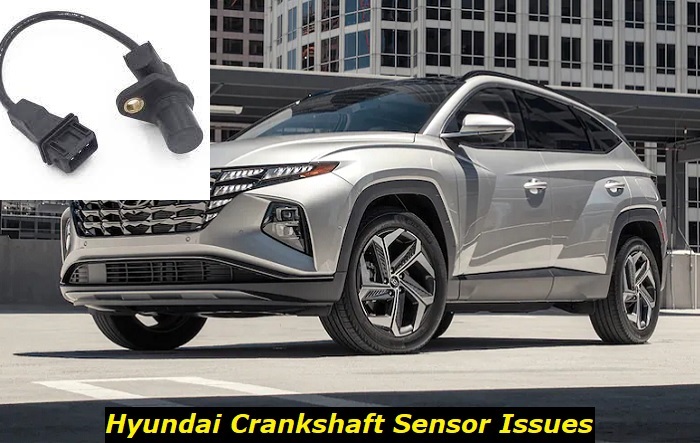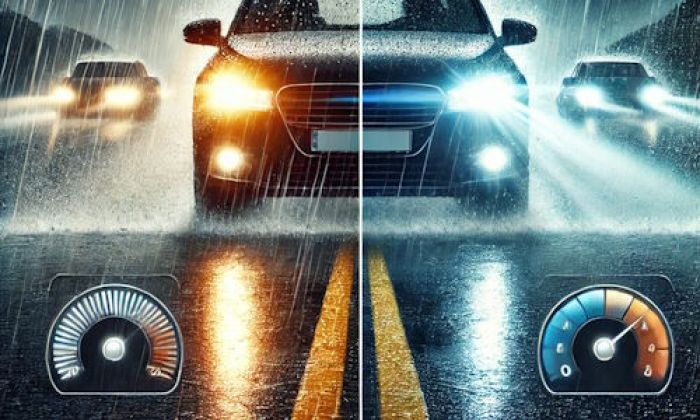As you go to work one day, your Hyundai just refuses to start. After several attempts, the engine finally responds. But your relief is short-lived - it stalls again just a few miles later. This eventually starts happening every single day. Frustrated, you're ready to take your car to the nearest wreck yard.
Engine sensors problems highlights
- DIY repairs:possible
- Tools needed:scanner,basictools
- Commonreasons:sensor problems, electric supply issues, software glitches
- Time to repair:1 - 2.5 hours
- Price for parts:$50 - $250
- Can you drive?In most cases, yes
- Alternative solutions:bypassing, driving in limp mode, roadside assistance

Is a faulty crankshaft sensor on your Hyundai a serious issue?
The crankshaft sensor is a vital component of most internal combustion engines. Your Hyundai uses it to detect the position and rotational speed of the crankshaft. It relays this information to the engine control unit. If faulty, your engine will stall and might not even start to begin with.
Thus, this is one of the more serious issues your Hyundai might have. The crankshaft sensor ensures a smooth ride. When it breaks, you will experience a lot of stalling. In the best-case scenario, this is nothing more than a minor nuisance. But in the worst-case scenario, it may lead to accidents. This is very likely when your Hyundai stalls at a junction.
But even if you don't get into an accident, you shouldn't drive your Hyundai with a bad crankshaft sensor. Apart from affecting drivability, this issue can lead to permanent damage. Repairs of this caliber are rarely cheap. To avoid these expenses, you should address this issue as first as you notice it.
This cart part costs anywhere from 50 to 150 dollars.
What causes the crankshaft sensor on your Hyundai to go bad?
Crankshaft sensor problems on your Hyundai are often caused by two issues:
- Overheating engine
Overheating worsens your engine's performance. Left unchecked, it can cause your engine to wear down prematurely. However, it can indirectly lead to other issues. In our case, overheating may melt some components of your crankshaft sensor. As a result, your Hyundai will stall frequently. Direct damage to the sensor means you'll likely have to replace it. Unfortunately, this means you'll have to visit a mechanic.
But why does your Hyundai engine overheat in the first place? While it may happen for several reasons, the most common one is insufficient engine oil. We see this problem daily. Low oil levels increase friction. As the metallic parts grind against each other, they generate high temperatures. If so, replacing the sensor isn't enough. To prevent the issue from reoccurring, make sure you keep the oil levels stable.
- Faulty wiring
Your Hyundai crankshaft sensor is an electrical component. It's connected to the power source via a system of wires. When the wiring goes bad, the sensor won't function properly. Some common causes are improper voltage and loose or rusty wires. Thus, the sensor itself isn't damaged. But because it doesn't receive a steady supply of power, it won't function properly.
This likely isn't an issue you can fix yourself. Tinkering with loose wires without proper knowledge will do more harm than good. Not to mention it's a huge safety hazard. Sadly, you'll have to leave the repairs to a professional.
7 symptoms your Hyundai has crankshaft sensor problems
The crankshaft sensor ensures the engine runs smoothly. If damaged, your Hyundai will experience several problems. Most of them are related to a poorly functioning engine. While you mostly can drive your Hyundai despite these symptoms, it will be incredibly frustrating. We advise visiting the near mechanic if you suspect your crankshaft sensor has gone bad.
Here are the 7 symptoms of a bad crankshaft sensor on your Hyundai:
1) Check Engine Light appears on your dashboard
Most cars have systems in place that can detect potential issues. Hyundai is no different. The easiest symptoms to spot will be on your dashboard. When the vehicle detects poor engine function, it will turn on the Check Engine Light. But keep in mind that many engine-related issues can cause these symptoms. Make sure you go over all the signs on this list for the most accurate diagnosis.
You may also use a diagnostic tool. These tools display a diagnostic trouble code that pinpoints the origin of the issue. In case of crankshaft sensor issues, this code should be P0335 for most Hyundai models. Some may display the P0340 code instead.
2) Your Hyundai won't start properly
The crankshaft sensor helps coordinate the engine's ignition. This is because it detects the crankshaft's position, speed, and other parameters. When its signals become disrupted, the engine won't start properly. As a result, it may take you several attempts to start your Hyundai. In some cases, it won't start at all.
However, this symptom is very vague on its own. Several reasons may lead to starting issues, such as a bad battery. But if you experience this together with other symptoms, the crankshaft sensor is likely to blame.
3) Your Hyundai stalls frequently
The crankshaft sensor sends engine information to the PCM. This allows the PCM to control its parameters. If the sensor's faulty, the signals will randomly cut off as you drive the car. This leads to stalling. The more damaged the sensor is, the more frequently stalling will occur. This issue may also be related to Hyundai's wiring.
4) You experience delayed acceleration
The PCM uses data from the crankshaft sensor to adjust the spark and fuel injection as needed. If disrupted, your Hyundai won't respond as fast to acceleration. You can notice this when you press the gas pedal. If it takes a while to increase your speed, the crankshaft sensor has likely gone bad.
5) Your Hyundai misfires
Your Hyundai's engine contains several cylinders. Each cylinder generates power by burning fuel. Misfiring occurs if one or more cylinders lag behind. As a result, your vehicle will briefly lose power. A bad crankshaft sensor is one of the many reasons this can happen. It helps the PCM control the pistons. When it sends faulty signals, the cylinders won't work properly.
You may also experience severe vibrations during misfiring
6) Rough idling and strong vibrations
When you stop with the engine running, you may experience notice the engine grinding and vibrating. We call this rough idling. It often occurs when your sensor doesn't read the crankshaft's position accurately. The false reading will cause your engine to vibrate and lose power.
Any excessive vibrations may also point to other serious issues. If your Hyundai experiences these symptoms, have it checked by a mechanic as soon as possible.
7) Poor fuel economy
Fuel injectors rely on the information from the crankshaft sensor to function properly. A bad sensor can disrupt the fuel injector, causing your engine to use up more fuel than necessary. This leads to poor fuel economy. If you notice your Hyundai eats up your gas faster than usual, your sensor may be bad. We recommend visiting an auto repair shop if this is the case. Though it may not look that way, it's much cheaper than stopping at a gas station every few miles.
Can you fix crankshaft sensor problems on your own?
Unfortunately, you likely won't be able to repair the crankshaft sensor yourself. The damage mostly results from an overheating engine. As some parts of the sensor melt, it stops working properly. Thus, it will need to be replaced. Replacing the sensor requires mechanical knowledge and you should thus leave it to a professional. If you don't replace it correctly, you'll do more harm than good.
Sometimes, the crankshaft sensor won't work because the wiring is faulty. Once again, you should let a professional deal with electrical circuits. Trying to fix the issue may not only endanger your life but also further damage your Hyundai.
While you have little control over the wiring, you can prevent your engine from overheating. Engines generally overheat when your Hyundai's oil levels run low. Once it overheats, it can damage the sensor and other nearby components. Fortunately, a little bit of maintenance can go a long way. Make sure your oil levels always touch the mark. Replacing the oil costs nothing and doesn't take a long time.
Keep in mind that the engine will be hot once you turn off your Hyundai. Before you check the oil levels, wait for it to cool down.
Final thoughts on the Hyundai crankshaft sensor problems
The crankshaft sensor is important for every vehicle with an internal combustion engine. It monitors the state of the crankshafts and sends the data to the PCM. This allows the PCM to adjust the engine as needed.
Crankshaft sensor issues usually arise for two reasons. Firstly, it can be caused by high engine temperatures. The heat can melt some parts of the sensor, making it malfunction. The most common reason why engines overheat is low oil levels. Secondly, the sensor may not work properly because of faulty wiring.
A bad crankshaft sensor will lead to severe symptoms in your Hyundai. For instance, you'll have a hard time starting your vehicle. Furthermore, the engine will stall frequently. You may also experience rough idling and misfiring.
Fixing this issue is tricky as it requires professional help. In most cases, you'll have to have the sensor replaced. Unfortunately, you'll need to visit a mechanic to carry out these repairs.
About the authors
The CarAraC research team is composed of seasoned auto mechanics and automotive industry professionals, including individuals with advanced degrees and certifications in their field. Our team members boast prestigious credentials, reflecting their extensive knowledge and skills. These qualifications include: IMI: Institute of the Motor Industry, ASE-Certified Master Automobile Technicians; Coventry University, Graduate of MA in Automotive Journalism; Politecnico di Torino, Italy, MS Automotive Engineering; Ss. Cyril and Methodius University in Skopje, Mechanical University in Skopje; TOC Automotive College; DHA Suffa University, Department of Mechanical Engineering





Add comment